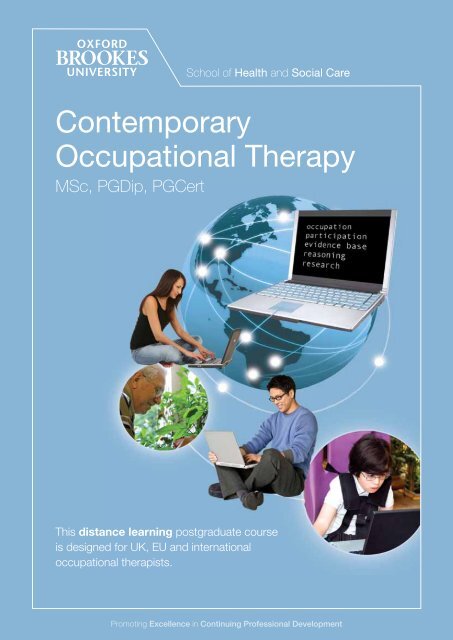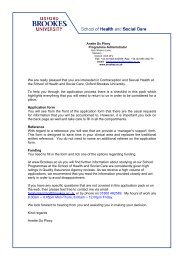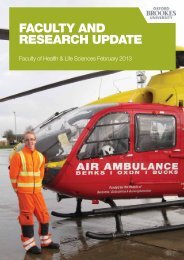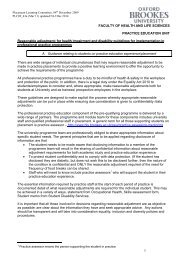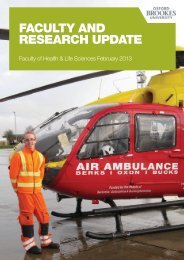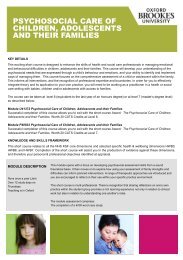Contemporary Occupational Therapy - Faculty of Health and Life ...
Contemporary Occupational Therapy - Faculty of Health and Life ...
Contemporary Occupational Therapy - Faculty of Health and Life ...
Create successful ePaper yourself
Turn your PDF publications into a flip-book with our unique Google optimized e-Paper software.
<strong>Contemporary</strong> <strong>Occupational</strong> <strong>Therapy</strong>Course overviewThis distance learning course is designed for UK, EU <strong>and</strong> international occupational therapists.<strong>Occupational</strong> therapists need to respond to an ever-changing <strong>and</strong>challenging practice environment. Throughout this course, you will gainthe skills <strong>and</strong> knowledge to help you transform your own practice <strong>and</strong> that <strong>of</strong>the teams within which you work, <strong>and</strong> increase the infl uence you have onyour organisations.Oxford Brookes already has an excellent reputation <strong>and</strong> a long <strong>and</strong> prestigioushistory for pre-qualifying occupational therapy education. Dorset House,School <strong>of</strong> <strong>Occupational</strong> <strong>Therapy</strong> in Oxford was a pioneering institution inoccupational therapy which dates back to the 1930s <strong>and</strong> became part <strong>of</strong> theSchool <strong>of</strong> <strong>Health</strong> <strong>and</strong> Social Care at Oxford Brookes in 1997.View our library archive: www.brookes.ac.uk/library/speccoll/dorset.html<strong>Occupational</strong> therapists are part <strong>of</strong> an international community, irrespective <strong>of</strong>location or culture. E-learning <strong>of</strong>fers accessible, fl exible <strong>and</strong> modern learningmethods to meet the expectations <strong>of</strong> pr<strong>of</strong>essionals in the 21st century.All students on the course will have different levels <strong>of</strong> pr<strong>of</strong>essional knowledge,clinical experience, technical <strong>and</strong> life skills. We value these differences<strong>and</strong> believe that students learn best by sharing their experiences <strong>and</strong> byworking collaboratively. The course therefore <strong>of</strong>fers plenty <strong>of</strong> opportunities fordiscussion, refl ection <strong>and</strong> joint working, as well as a communal online area foryou to contribute to the development <strong>of</strong> the discipline.Features <strong>of</strong> thiscourse include:• Distance learning, with an emphasis on working together in anonline community.• The opportunity to explore a specialist area <strong>of</strong> practice <strong>and</strong> to apply itthrough a work-based learning module.• The chance to study with students from different pr<strong>of</strong>essions.• The development <strong>of</strong> research skills <strong>and</strong> the opportunity to undertakean in depth study on a topic <strong>of</strong> your choice.Course contentAll your modules will be delivered electronically using ‘Brookes VirtualGateway’; an online repository <strong>of</strong> lectures, h<strong>and</strong>outs, information <strong>and</strong>learning exercises. Three modules are compulsory for all levels <strong>of</strong> this course:1. <strong>Occupational</strong> <strong>Therapy</strong>: New PerspectivesThis module will provide you with the opportunity to develop yourunderst<strong>and</strong>ing <strong>of</strong> current perspectives informing contemporary occupationaltherapy practice. You will explore established <strong>and</strong> emerging theory <strong>and</strong>research in the areas <strong>of</strong> occupation <strong>and</strong> occupational performance.You will have the opportunity to further underst<strong>and</strong> the evolving discipline <strong>of</strong>occupational science, considering the factors that contribute to the health<strong>and</strong> well being <strong>of</strong> individuals, groups <strong>and</strong> communities from an occupationalperspective. Through the learning activities you will analyse the contexts <strong>and</strong>infl uences on occupational therapy practice now <strong>and</strong> in the future.2. Mastering Pr<strong>of</strong>essional PracticeThis module aims to extend your underst<strong>and</strong>ing <strong>of</strong> pr<strong>of</strong>essional practicebeyond that <strong>of</strong> competence to one <strong>of</strong> mastery. Through examining the nature<strong>of</strong> pr<strong>of</strong>essional practice, including the concepts <strong>and</strong> theoretical perspectives<strong>of</strong> your own pr<strong>of</strong>ession, you will be able to blend this knowledge with yourown experiences to arrive at a new way <strong>of</strong> knowing <strong>and</strong> enacting youroccupation therapy pr<strong>of</strong>essional role. This module enables you to analyse<strong>and</strong> debate key theories <strong>and</strong> issues in the advancement <strong>of</strong> your pr<strong>of</strong>essionalpractice.You will examine developments within occupational therapy <strong>and</strong> in relation toyour own role. You will be supported in the enhancement <strong>of</strong> self-awareness<strong>and</strong> personal/pr<strong>of</strong>essional growth through the use <strong>of</strong> strategies that includerefl ective practice <strong>and</strong> critical thinking. You will be facilitated in analysing<strong>and</strong> debating real issues from your practice, using student-centred learningapproaches such as online action learning <strong>and</strong> online group discussion.Key facts...The course starts in September (Semester 1). In exceptional circumstances,you may be able to start in January (Semester 2). Please contact us forfurther information.Full-time: MSc: 12 monthsPart-time: MSc: 3-5 yearsNote: Oxford Brookes operates the European Credit Transfer System (ECTS).All postgraduate single modules are equivalent to 10 ECTS credits,double modules to 20 ECTS credits, <strong>and</strong> treble modules to 30 ECTScredits. A full master’s course will carry 90 ECTS credits.See website for more information: http://ec.europa.eu/education/lifelong-learning-policy/doc48_en.htm3. Evidence-based practiceYou will explore <strong>and</strong> critique theories, models <strong>and</strong> strategies for evidencebasedpractice, <strong>and</strong> apply it to the health <strong>and</strong> social care setting.You will examine the purposes, uses <strong>and</strong> limitations <strong>of</strong> various approachesto evidence-based practice, with consideration <strong>of</strong> political <strong>and</strong> economicdimensions. You will consider the concepts <strong>of</strong> decision-making from thepractitioner, purchaser, provider <strong>and</strong> consumer perspectives <strong>and</strong> explorethe tools for critical-appraisal <strong>and</strong> the transfer <strong>of</strong> evidence to pr<strong>of</strong>essionalknowledge. You will share the work <strong>of</strong> experts, researchers <strong>and</strong> the studentgroup for discussion <strong>and</strong> critique.In addition, for the PGDip <strong>and</strong> MSc, the following module is compulsory:Advanced Research DesignThis module aims to equip you with skills to fi nd, appraise <strong>and</strong> utiliseresearch, as well as plan <strong>and</strong> design a piece <strong>of</strong> research work. It seeks toprepare you to defi ne a suitable research question <strong>and</strong> to use this as a basisfor identifying appropriate research methodologies for a small-scale researchproject or dissertation. This module is designed to impart the skills to enableyou to plan <strong>and</strong> outline a rationale for a piece <strong>of</strong> primary research, secondaryanalysis, literature review or audit. It focuses on research as part <strong>of</strong> a body <strong>of</strong>evidence used for health <strong>and</strong> social care practice, <strong>and</strong> provides an overview<strong>of</strong> methodologies <strong>and</strong> methods commonly used in health <strong>and</strong> social carepolicies <strong>and</strong> working environments.You will then choose two <strong>of</strong> the following modules:1. Leadership in health <strong>and</strong> social care2. <strong>Health</strong> promotion3. Rehabilitation: theories <strong>and</strong> concepts <strong>and</strong> practical applications4. Vulnerable children <strong>and</strong> young people5. Substance misuse6. Work-based learning.To complete the MSc, you will be required to complete a Dissertation(triple module) – a 20,000 word research thesis.
Teaching, learning <strong>and</strong>assessmentTeaching <strong>and</strong> researchThis course places great emphasis on linking teaching <strong>and</strong> research.This is because the central focus <strong>of</strong> the course is the study <strong>of</strong> effective,evidence-based practice, <strong>and</strong> research enables you to base decisionson sound evidence. Lecturers on this course are actively involved inresearch, which helps to ensure the teaching is closely linked to currentresearch – something which is particularly important if you are undertakinga research dissertation. The Advanced Research Design module,compulsory for the PGDip <strong>and</strong> the MSc, will enable you to underst<strong>and</strong>the relationship between methodology <strong>and</strong> method, <strong>and</strong> to appreciate thetheoretical underpinning <strong>of</strong> research-based decisions.<strong>Contemporary</strong> <strong>Occupational</strong> <strong>Therapy</strong>➜Student pr<strong>of</strong>i leName: Rosie HaleStudying: <strong>Contemporary</strong> <strong>Occupational</strong> <strong>Therapy</strong>I have been an occupational therapist for three years <strong>and</strong> Iam currently working in a Mental <strong>Health</strong> Crisis Team.I chose Oxford Brookes as I felt the course was unique <strong>and</strong> itis distance learning, which means that I am able to continueto work full-time.I hope that the course will allow me to develop my clinicalreasoning, refl ection skills <strong>and</strong> evidence-based practice sothat I may continue to move forward in my career.Course feesApplicants should contact the Programme Administrator fordetails <strong>of</strong> course fees.Note: All applicants (UK, EU <strong>and</strong> International) will be requiredto provide details <strong>of</strong> their funding arrangements prior toenrolment on the course.An international curriculumThe course content is informed by relevant international research, <strong>and</strong>international literature is used as comparative material. This is important tohelp you develop a depth <strong>of</strong> critical analysis <strong>and</strong> evaluation.In addition, in health <strong>and</strong> social care studies we believe it is important topromote the underst<strong>and</strong>ing <strong>of</strong> the beliefs, attitudes <strong>and</strong> values <strong>of</strong> differingcultures, <strong>and</strong> their effect <strong>and</strong> infl uence on practice across the globe.AssessmentEach module will be assessed separately, normally through anassignment <strong>of</strong> 3,500 words. Assignments will be individually graded.You are also expected to assess your own participation in coursework<strong>and</strong> e-group activities through self-assessment exercises.Student supportAll our courses adopt a student-centred approach to teaching <strong>and</strong>learning <strong>and</strong> are strongly focused on encouraging each individual to attaintheir full potential as lifelong learners. To facilitate this, you will encounter avariety <strong>of</strong> online teaching methods, both traditional <strong>and</strong> innovative, whichare designed to support your needs as a distance learner.The assessments by coursework are varied in style <strong>and</strong> include (butare not limited to) essays, critical reviews, case studies <strong>and</strong> virtualpresentations. MSc students will also write a dissertation on a topic <strong>of</strong>their choice. Distance learning materials are provided to guide you duringyour studies; these include study guides <strong>and</strong> course readers.You will be supported throughout the course by academic skills advice,an allocated academic adviser <strong>and</strong> module <strong>and</strong> dissertation support.The student support co-ordinators provide a service for any queries youmay have about any aspect <strong>of</strong> student life, covering both academic <strong>and</strong>personal welfare. The university’s support services include Upgrade whichprovides advice on study skills such as planning <strong>and</strong> writing essays,assignments <strong>and</strong> dissertations, research, or preparing for an exam.They also give advice on statistics <strong>and</strong> maths.There is a dedicated Student Disability <strong>and</strong> Dyslexia Service, whichprovides support for students with disabilities including sensory <strong>and</strong>mobility impairments, dyslexia <strong>and</strong> other specifi c learning diffi culties,mental health problems <strong>and</strong> medical conditions. They <strong>of</strong>fer advice<strong>and</strong> support on a range <strong>of</strong> issues, including physical access, funding,alternative assessment arrangements <strong>and</strong> liaison with teaching staff toensure that they are aware <strong>of</strong> your requirements.Useful links➜➜➜University support services:www.brookes.ac.uk/studying/life/wellbeingUpgrade Study Advice Centre:www.brookes.ac.uk/services/upgrade/Student support co-ordinators:http://shsc.brookes.ac.uk/student-support-coordinators


